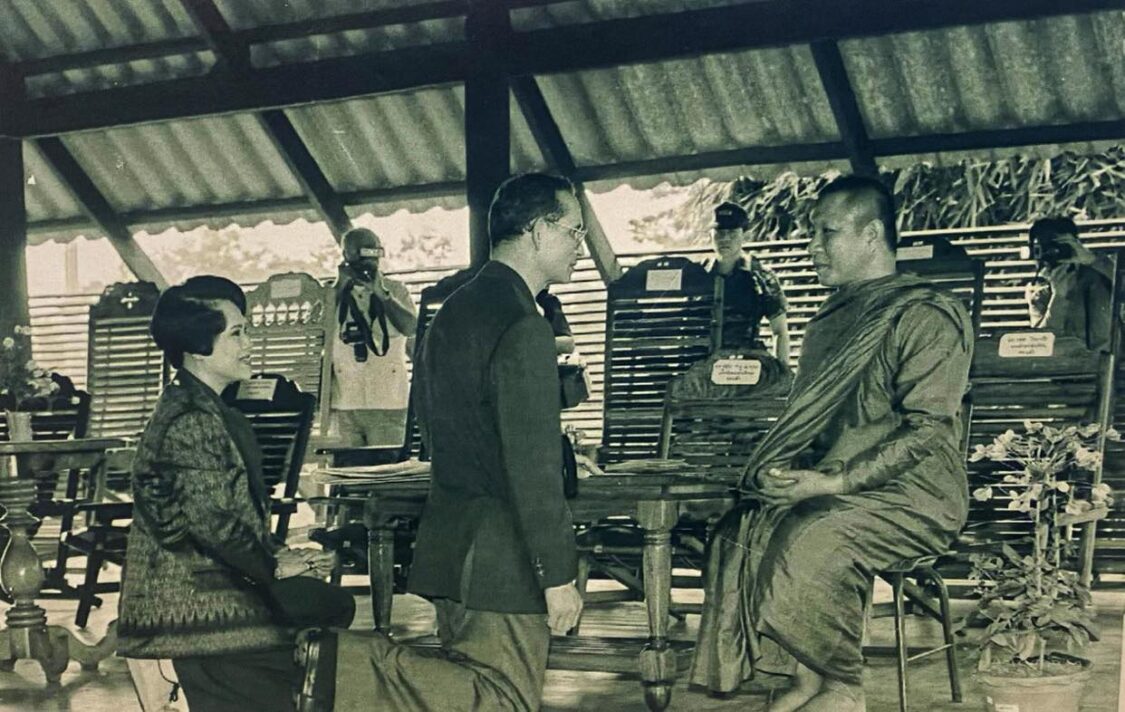The Ten Virtues of a Righteous King of Thailand

Seen Above: King Bhumibol Adulyadej the Great, along with the current King of Thailand, HM Maha Vajiralongkorn (in uniform), in Sakon Nakhon Province
As we approach Coronation Day in Thailand, now is a good time to reflect on the “Tenfold Virtues of the Ruler,” otherwise known as the Dasavidha-Rajadhamma. These principles are a Buddhist Dharma (teaching) that has served as a moral and ethical guide to all of Thailand’s rulers — having first been exemplified by King Asoka of India, who ruled from 273 BC – 232 BC.
King Asoka (a great warrior and winner of many battles) eventually renounced violence and ceased all conflicts with his neighbors. He embraced Buddhism, and developed a thriving Kingdom, famous for its accomplishments, wisdom, and kindness.
In the Thai language, the 10 Virtues of a Righteous King are called the Totsapit Rachatham (ทศพิธราชธรรม). It has served as a guide to Thailand’s rulers since the Sukhothai period (13th – 15th century Siam), when these virtues were believed to help restrain the excesses and temptations of a Monarch with absolute power.
King Bhumibol Adulyadej the Great — the father of Thailand’s current King, HM Maha Vajiralongkorn — was considered a great exemplar of the 10 Virtues of a Righteous King, as His Majesty always placed the happiness of the Thai people as his top priority, and strove to serve as an embodiment of the Dharma (Buddhist teachings) to the Thai people.
HM King Bhumibol’s commitment to embodying the Dharma was demonstrated in his frequent meetings with revered Thai monks, such as Ajarn Fan Acharo of Sakon Nakhon, in order to discuss the Dharma and seek spiritual advice.
The reason it is important for everyone to reflect on the “Tenfold Virtues of the Ruler” on Coronation Day is that we are all rulers over our own lives, and the Kingdom of the self. Therefore, this Dharma guidance applies not only to Monarchs but also to ourselves.

The 10 Virtues of the King of Thailand
Buddhism teaches that every ruler of Thailand should strive to perfect the following virtues.
Thaan (ทาน) means “alms,” which signifies giving, sharing, being generous (both physically and mentally). It also means engaging in actions that have a public benefit, sacrificing your time, money, or effort to help others.
Sila (ศีล) means good conduct, being honest and fair. It means peace and tranquility, having the ability to control your body, speech and mind, and thus earning the respect of people.
Parit Jaka (ปริจจาคะ) means sacrificing your happiness and personal pleasure for the benefit of the people, citizens, or for the peace and order of the country.
Aatchawa (อาชชวะ) means honesty and the determination to do what is right.
Mattawa (มัททวะ) means gentleness and politeness — having a gentle, non-pretentious nature, as well as elegance and demeanor that is both loving and reverent.
Dtapa (ตบะ) means penance, which requires demonstrating the perseverance, restraint, and power that is the source of royal majesty.
Akgota (อักโกธะ) means not being angry and always having kindness in your heart.
Awihingsa (อวิหิงสา) means non-violence, and avoiding those actions which oppress others, especially actions that are due to lack of kindness or a selfish appeal to one’s authority position.
Khanti (ขันติ) means patience and forbearance — enduring hard work without giving up nor feeling discouraged; possessing the strength to never abandon work that you know is righteous.
Awirotana (อวิโรธนะ) means adherence to Dharma with objectivity and accuracy — never straying into unethical conduct.
- Affirmations in Buddhism & Thailand - June 7, 2025
- Speak Thai Naturally Without the Gymnastics - April 20, 2025
- The Best Learn Thai Podcast and YouTube Channel - April 10, 2025




